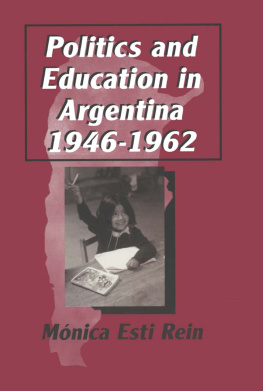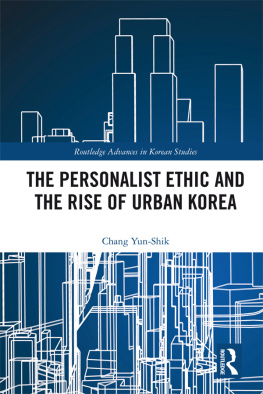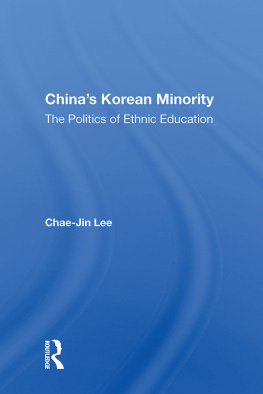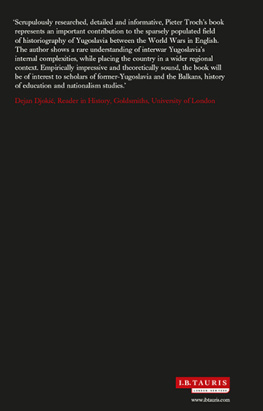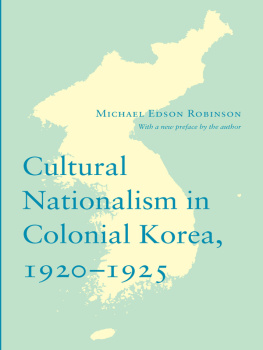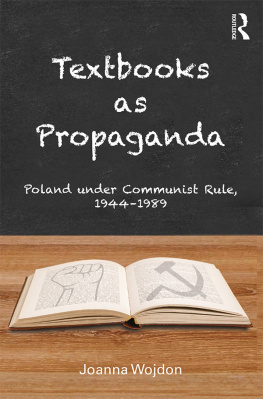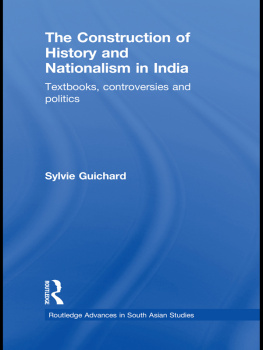Published in 2000
by Routledge
270 Madison Ave,
New York NY 10016
Routledge is an imprint of the Taylor & Francis Group
Transferred to Digital Printing 2009
Copyright 2000 by Yoonmi Lee
All rights reserved. No part of this book may be reprinted or reproduced or utilized in any form or by any electronic, mechanical, or other means, now known or hereafter invented, including photocopying and recording, or in any information storage or retrieval system, without written permission from the publishers.
Library of Congress Cataloging-in-Publication Data
Lee, Yoonmi.
Modern education, textbooks and the image of the nation : politics of modernization and nationalism in Korean education / Yoonmi Lee.
p. cm. (East Asia)
Includes bibliographical references and index.
ISBN 0-8153-3874-0 (alk. paper)
1. TextbooksKoreaHistory. 2. TextbooksSocial aspects Korea. 3. Nationalism and educationKorea. I. Title: Modern education, textbooks, and image of the nation. II. Title. III. East Asia (New York, N.Y.)
LB3048.K6+
370.9519dc21
00-034725
Publishers Note
The publisher has gone to great lengths to ensure the quality of this reprint but points out that some imperfections in the original may be apparent.
Preface and Acknowledgments
This book was originally a doctoral dissertation completed at the University of Wisconsin-Madison in 1997. It is a great pleasure to have my work published in a form readable to a larger and broader group of audience. I am sincerely grateful to Professor Edward Beauchamp at the University of Hawaii for reviewing my work and recommending it for publication.
The theme of this book concerns the meaning of the nation in modern Korean society and the role of modern mass education in that particular context. Nationalism, in its modern sense, has been hotly debated since the late nineteenth-century Korea, to the degree that it looks natural. In a non-Western country such as Korea, nationalism has complexly been related to modernization, Westernization, colonization/ de-colonization, mass literacy and mobilization, ideological conflicts and other politically delicate issues.
This book was targeted at addressing a couple of different yet connected issues. One of my primary goals was to de-mystify or de-naturalize Korean nationalism and trace its modern formation. In dealing with this issue I intended to address different messages to different audiences, although I am clearly aware that readers take their own positions in their readings regardless of my intention. Especially for those who might still think that the part of Korean history that I have dealt with is not yet a history, I was trying to clarify what may look quite familiar unfamiliar, suggesting that things look different when more sensitivity is rendered to things regarded as given.
I also tried to illuminate the politics of nationalism as it leads to a construction of modern national identity in Korea. By analyzing the tensions between Asianist and nationalist tendencies, I connected the ethos of my work with the question of Orientalism and tried to show that modern nationalism was a constructive reaction to the crisis sensed by Korean nationalists and people in response to the challenge of the West. I discussed that despite the basic worldview that was accepted at the time by the modernizing nationalists was social Darwinian or pro-West, it also contained potentials of de-centralizing from the West. The modernization discourse also had deconstructive potentials that had led to a particularistic nationalism. I discuss, nonetheless, that despite the typically benign effects of Third World nationalism which resists imperialist domination, it is crucial to note that nationalism is on the other hand a discursive device or a homogenizing discourse having contradictory effects. It is, on the one hand, a discourse that elevates the previously alienated members of the society such as the working class and women up to the category of citizenry, yet on the other, it limits the role of the newly accepted members in accordance with collectivist ideals and norms pertaining to the elitist or dominant definition of the nation, thereby leaving room for further debates and reconstructions.
This book is also, or mainly, about a history of education. It discusses the recontextualized logic of education that enabled important constructions. In the project of modernization, influenced by the nationalists social Darwinist interpretation of Western modernity, education occupied a crucial position in politics. I tried to distinguish between the symbolic politics and real politics, as perceived by the reformers, to identify the nature of the expectation that modern mass education carried during the period under study. This study focuses on the particular way textbooks gradually reconstructed a sense of cultural purity in relation to the changing politics, and also constructed an ideological sense of unity out of actual differences in the society.
Modern education represented a sense of hope for the future which was justified by the social Darwinian world view prevalent at the time. The sense of crisis provoked by the expansion of Western modernity overwhelmed the Koreans at the time, and the modernization assumptions that somehow, if due effort is made, latecomers may catch up, made education, perceived as the very means to catch up, assume a crucial position. Interconnected with the urge for modern nationalism, modern education, especially mediated through textbooks, became an important arena where discourses are created and circulated. Textbooks published between 1890s and 1900s carried this hope for the future and became sites for constructions of national images in a modern form. This book argues that although the perceived modernity was, in a sense, fundamentally Western, the process of modernization in Korea did contribute to the construction of a nation-for-itself. It was through this symbolic politics of education that a modern nation was reconstructed into the form that persistently has exercised its influence in modern Korean history.
This work is a product of my six-year study as an inter-national student in the United States. Struggles to cope with the politics of history and society have continuously been the intellectual concerns that I was engaged since I entered Ewha Womens University in Seoul, in 1984, when the political milieu was terrible but intellectual aspiration was upheaving among the students. As a constituent of the so-called 386 generation (a term referring to those who are currently in their 30s, went to college in the 80s and born in the 60s in Korea; coined after the outdated computer version to denote symbolic meanings to the age cohort who shared the political events and the atmosphere of the 1980s) in Korea, studying in the United States had many complicated personal meanings. This work is, in a sense, a condensed expression of that complication.
I am indebted to many persons while completing this book. The influence of Professor Michael Apple at the University of Wisconsin-Madison, my thesis advisor, with theoretical insights and constructive discussions, has deeply shaped the intellectual suppositions of this work. Throughout my studies in the United States his perceptiveness especially helped me carry out the difficult work of culturally and politically translating between different worlds, and enhanced my sensitivity to social and political implications of educational research. He has been a great teacher who has always, academically and personally, encouraged me not to give up in the time of crisis and has inspired me with the academic messages that I have had to struggle with even after my return to Korea. I am also greatly indebted to Robert Koehl for his excellent teaching in comparative and historical studies of education, and his intellectual advices and personal encouragement. This work owes much to his acute readings, and his thoughtful comments. I am much influenced by his scholarly rigor as a historian as well as comparativist, and his influence will live with me throughout my professional career. I am also deeply grateful to Herbert Kliebard for his constructive comments and support. His seminar on the history of curriculum inspired me with insights in formulating the ideas of this book. I would like to express my sincere appreciation to Francis Schrag and William Reese for their careful reading and comments, which were very important in refining my own assumptions and propositions as well as re-reading and revising the final drafts.




